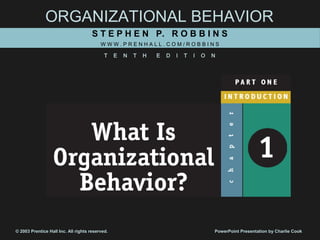
Ch01
- 1. ORGANIZATIONAL BEHAVIOR S T E P H E N P. R O B B I N S WWW.PRENHALL.COM/ROBBINS T E N T H E D I T I O N © 2003 Prentice Hall Inc. All rights reserved. PowerPoint Presentation by Charlie Cook
- 2. O B J E C T I V E S AFTER STUDYING THIS CHAPTER, YOU SHOULD BE ABLE TO: 1. Define organizational behavior (OB). 2. Describe what managers do. 3. Explain the value of the systematic study of L E A R N I N G OB. 4. List the major challenges and opportunities for managers to use OB concepts. 5. Identify the contributions made by major behavioral science disciplines to OB. © 2003 Prentice Hall Inc. All rights reserved. 1–2
- 3. O B J E C T I V E S (cont’d) AFTER STUDYING THIS CHAPTER, YOU SHOULD BE ABLE TO: 6. Describe why managers require a knowledge of OB. 7. Explain the need for a contingency approach to the study of OB. 8. Identify the three levels of analysis in this book’s model. L E A R N I N G © 2003 Prentice Hall Inc. All rights reserved. 1–3
- 4. What Managers Do What Managers Do Managerial Activities Managerial Activities ••Make decisions Make decisions ••Allocate resources Allocate resources ••Direct activities of others Direct activities of others to attain goals to attain goals © 2003 Prentice Hall Inc. All rights reserved. 1–4
- 5. Where Managers Work Where Managers Work © 2003 Prentice Hall Inc. All rights reserved. 1–5
- 6. Management Functions Management Functions Planning Planning Organizing Organizing Management Management Functions Functions Controlling Controlling Leading Leading © 2003 Prentice Hall Inc. All rights reserved. 1–6
- 7. Management Functions (cont’d) Management Functions (cont’d) © 2003 Prentice Hall Inc. All rights reserved. 1–7
- 8. Management Functions (cont’d) Management Functions (cont’d) © 2003 Prentice Hall Inc. All rights reserved. 1–8
- 9. Management Functions (cont’d) Management Functions (cont’d) © 2003 Prentice Hall Inc. All rights reserved. 1–9
- 10. Management Functions (cont’d) Management Functions (cont’d) © 2003 Prentice Hall Inc. All rights reserved. 1–10
- 11. Mintzberg’s Managerial Roles Mintzberg’s Managerial Roles © 2003 Prentice Hall Inc. EXHIBIT 1-1a All rights reserved. 1–11
- 12. Mintzberg’s Managerial Roles (cont’d) Mintzberg’s Managerial Roles (cont’d) © 2003 Prentice Hall Inc. EXHIBIT 1-1b All rights reserved. 1–12
- 13. Mintzberg’s Managerial Roles (cont’d) Mintzberg’s Managerial Roles (cont’d) © 2003 Prentice Hall Inc. EXHIBIT 1-1c All rights reserved. 1–13
- 14. Management Skills Management Skills © 2003 Prentice Hall Inc. All rights reserved. 1–14
- 15. Effective Versus Successful Managerial Effective Versus Successful Managerial Activities (Luthans) Activities (Luthans) 1. Traditional management 1. Traditional management • •Decision making, planning, and controlling Decision making, planning, and controlling 2. Communications 2. Communications • •Exchanging routine information and processing Exchanging routine information and processing paperwork paperwork 3. Human resource management 3. Human resource management • •Motivating, disciplining, managing conflict, staffing, Motivating, disciplining, managing conflict, staffing, and training and training 4. Networking 4. Networking • •Socializing, politicking, and interacting with others Socializing, politicking, and interacting with others © 2003 Prentice Hall Inc. All rights reserved. 1–15
- 16. Allocation of Activities by Time Allocation of Activities by Time © 2003 Prentice Hall Inc. EXHIBIT 1-2 All rights reserved. 1–16
- 17. Enter Organizational Behavior Enter Organizational Behavior © 2003 Prentice Hall Inc. All rights reserved. 1–17
- 18. Contributing Disciplines to the OB Field Contributing Disciplines to the OB Field © 2003 Prentice Hall Inc. EXHIBIT 1-3a All rights reserved. 1–18
- 19. Contributing Disciplines to the OB Field (cont’d) Contributing Disciplines to the OB Field (cont’d) © 2003 Prentice Hall Inc. EXHIBIT 1-3b All rights reserved. 1–19
- 20. Contributing Disciplines to the OB Field (cont’d) Contributing Disciplines to the OB Field (cont’d) © 2003 Prentice Hall Inc. EXHIBIT 1-3c All rights reserved. 1–20
- 21. Contributing Disciplines to the OB Field (cont’d) Contributing Disciplines to the OB Field (cont’d) © 2003 Prentice Hall Inc. EXHIBIT 1-3d All rights reserved. 1–21
- 22. Contributing Disciplines to the OB Field (cont’d) Contributing Disciplines to the OB Field (cont’d) © 2003 Prentice Hall Inc. EXHIBIT 1-3f All rights reserved. 1–22
- 23. There Are Few Absolutes in OB There Are Few Absolutes in OB x Contingency Variables y © 2003 Prentice Hall Inc. All rights reserved. 1–23
- 24. Challenges and Opportunity for OB Challenges and Opportunity for OB Responding to Globalization Managing Workforce Diversity Improving Quality and Productivity Responding to the Labor Shortage Improving Customer Service © 2003 Prentice Hall Inc. All rights reserved. 1–24
- 25. Challenges and Opportunity for OB (cont’d) Challenges and Opportunity for OB (cont’d) Improving People Skills Empowering People Coping with “Temporariness” Stimulation Innovation and Change Helping Employees Balance Work/Life Conflicts Improving Ethical Behavior © 2003 Prentice Hall Inc. All rights reserved. 1–25
- 26. Basic OB Model, Stage II Basic OB Model, Stage © 2003 Prentice Hall Inc. EXHIBIT 1-6 All rights reserved. 1–26
- 27. The Dependent Variables The Dependent Variables y © 2003 Prentice Hall Inc. x All rights reserved. 1–27
- 28. The Dependent Variables (cont’d) The Dependent Variables (cont’d) © 2003 Prentice Hall Inc. All rights reserved. 1–28
- 29. The Dependent Variables (cont’d) The Dependent Variables (cont’d) © 2003 Prentice Hall Inc. All rights reserved. 1–29
- 30. The Dependent Variables (cont’d) The Dependent Variables (cont’d) © 2003 Prentice Hall Inc. All rights reserved. 1–30
- 31. The Dependent Variables (cont’d) The Dependent Variables (cont’d) © 2003 Prentice Hall Inc. All rights reserved. 1–31
- 32. The Independent Variables The Independent Variables Independent Independent Variables Variables Individual-Level Group-Level Organization Organization Individual-Level Group-Level System-Level Variables Variables Variables Variables System-Level Variables Variables © 2003 Prentice Hall Inc. All rights reserved. 1–32